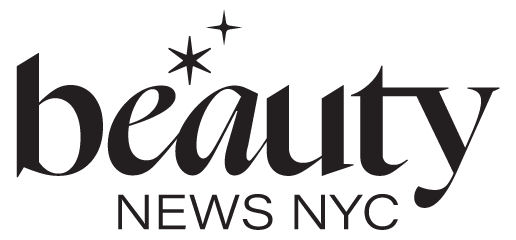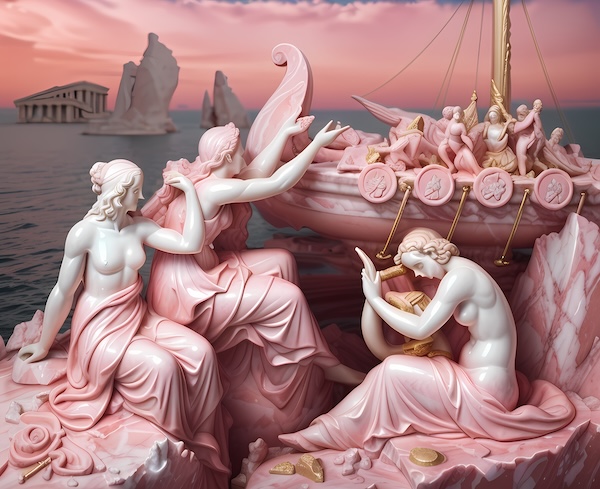
Neptune energy best comes when one has learned to somewhat play the game of life, at a time when the structures one has created threaten to take away the sense of aliveness. – Robert Hand, Horoscope Symbols (1981)
Hailed as an ‘ice giant,’ Neptune is the most distant planet in our solar system, the end of the chain of ‘official’ planets and the astrological gateway into the ‘transpersonal’ realm beyond the self. With powerful storm winds and a dynamic atmosphere that makes it appear blue, Neptune is roughly 17x the mass of Earth, taking 165 years to orbit the Sun. Neptune has fourteen known moons and a faint ring system which appears nearly imperceptible to the naked eye. Cold and fast, Neptune boasts the swiftest winds of our solar system, reaching speeds of up to 1,300 miles per hour. With average temperatures around -353°F, it is also the coldest planet. In Andrea Richards’ ASTROLOGY: The Library of Esoterica, one reads of Neptune invoking the spiritual world that science cannot circumscribe, recalling how Neptune’s presence was sensed by ancients far before its form was made visible by scientific advancements. Pulling back the curtain of reality, idealism and escapism hold hands in the great sea of Neptunian illusion. Ruling the physical anatomy of the feet, spinal column and nervous system, Neptune is exalted in Cancer (home and family life) and in fall in Capricorn (the workplace).
In my BEAUTYSCOPE on the Venus Star Point, I discussed how Neptune is considered the ‘Higher Octave’ of Venus (planet of love and relationship), providing a veritable antidote to the often self-indulgent vanities associated with the Goddess of Love & Beauty. Modern astrologers speak of how the discovery of asteroids and dwarf planets beyond Neptune we call ‘trans-neptunian’ unleashes a form of super-consciousness, a quantum leap for human evolution. In this light, trans-neptunian objects (TNOs) are those celestial bodies keyed into Neptune’s ‘higher octave’ of unconditional love. Like a guiding star of collective human evolution, TNOs elevate Neptune’s nebulous psychic opening into a progressive experience of collective reckoning.

How did such a faraway planet, too cold and distant for human habitation, become the symbol of the Unconditionally Loving Mother? The paradox reveals a lot about our male-dominated culture, as does the folklore around Neptune, the male face of mother-worship. Our work is to make sense of the many myths and stories that swirl in Neptune’s seas, interrogating our very human and universal desire for redemption. Astrologer Barbara Hand Clow expresses that the real confusion lies in this notion that we are somehow separate from divinity, which orthodox, monotheistic religions equate with a cold, distant male authority figure who overlooks and judges us from the ether. Despite the planet’s official ‘discovery’ in 1846, Neptune has long been a steady force channelled by seekers and seers. “The ancients worked with the outer planets as intuitive, unseen energies,” writes Hand Clow. As a representation of divinity within, Neptune requires the act of surrendering to greater, unknown cosmic forces.
In The Astrological Neptune and the Quest for Redemption, what I draw from in the Neptune astro-insights to follow, Liz Greene refers to Neptune’s energy as a “many-headed daimon” unleashed in our “yearning for a primal dream.” Distinct from the Christian connotations of demon, the term hints at the planet as a guiding spirit of inner awakening. Often sought out in surrogate forms, Greene writes that this daimon within us “Aspires toward some dimly sensed union with an all-seeing, all-loving, ineffable Other, in whose circling embrace may be found ultimate solace for the harsh limits of mortality.” Not to be confused with the Venusian realms of desire, passion, and love, the key to our understanding of Neptune is its descending spiral path of dissolution. Whether this appears in your life as a death-wish, unattainable lover, guru or trip to the cinema, art gallery or sensory deprivation tank – that’s on you! Neptune is neither angelic nor malefic. Any malevolence we attribute to it is actually a reflection of human rather than cosmic ill. Only in astrological language do we call it Neptune, named after the Roman God of the watery depths, aka the waters of pre-birth – maternal, cosmic or both.

The search for redemption is a primal desire that resonates deeply within us, a yearning for union with a nurturing cosmic force. This longing transcends simple relationships, embodying a desire for dissolution into a greater whole. Whether we channel our aspirations toward humanity, nature or champion concepts like art and love, this quest feels insatiable and universal. In a world that often makes us feel isolated, we naturally have come to create rituals and artistic expressions in hopes of reconnecting with the divine source from which we emerged. But what happens when inspired creativity spirals into tragedy or madness?
Greene asks, “When is an artist no longer merely tragic or mad, but a divinely inspired genius whose excesses are tolerated because his or her suffering dignifies our own? When is a visionary no longer merely a lunatic, but a saint?” Are artists divine geniuses transformed by their suffering, or are they simply fragile souls grappling with the chaos of life? Straddling the precarious balance between infantile regression and artistic genius, Neptune imbues the creative act with qualities of godliness. And yet, as creators, we must take a regular inventory of the self, asking, are we spiraling into a fantasy hedged against the chaos of the outside world, or elevating to the higher octave of love and unity?
Just as Neptune’s sign (Pisces) has been called the ‘dustbin’ of the zodiac, Neptune shows up in our lives in some of the most curious, ineffable and seemingly uncanny ways. What does hysteria, which the Greeks believed to be caused by a ‘wandering uterus’ have in common with addiction, oceanic peak experience, prisons and mental asylums, drama and movie stars, allergies, genetically engineered viruses, clowns, sacred cosmic union, ecstasy, Never-never-land, idolatry and infantile regression? Neptune, often misrepresented as a masculine deity, reveals underneath legions of cultural stories a primal feminine essence that is both creative and destructive.
Symbolizing the maternal waters of creation and equally, confusion and illusion, the key is to navigate Neptune’s depths with wise innocence. This is not an easy path, as embracing the full flowering of our humanity is to confront the darker emotions that stem from this longing for redemption. Hence the ‘mad genius’ or ‘hopeless romantic,’ stereotype – as we’ll read on, we’ll add to that the loser, martyr heretic, prophet, hysteric and siren, all fitting names for Neptunian shadows. As the longing for wholeness spirals into compulsive behaviors – manifesting in addiction, obsession or self-sacrifice – the lines between love and madness become blurred. Virtually anything can become a Neptunian drug, like the opening of the barred gates of a paradise lost. Drugs yes, but also sex and the wide range of so-called ‘eating disorders.’ Speaking to disordered eating, Green suggests it is actually the ‘good mother’ eaten with the cream buns and the ‘bad mother’ vomited up by the bulimic. With no logic penetrating the Neptunian realm, “The right hand of the addict claws desperately for freedom,” while the “left is securely chained to the miraculous redemption hidden in the poison,” warns Greene.

Neptune reminds us that within our yearning lies the power to reclaim our multifaceted nature as human beings – creative, destructive, becoming and dissolving as we do, lifetime after lifetime. This reclamation involves recognizing that our struggles are part of a larger spiritual tapestry. The primal waters – also taking the form of mist, clouds, steam, tear drops, sometimes even semen or milk – we seek to merge with represent both the nurturing aspects of creation and the chaotic forces threatening our individuality. By acknowledging and dignifying this duality, we honor both the pain and the beauty of existence. Throughout history and culture, we find religious and mythic narratives reinforcing this knowledge of divine mothers and primordial waters as sources of life and destruction. Figures like Ti’amat and the Sumerian goddess Nammu embody this maternal paradox—nurturers and destroyers, creators and chaos-bringers.
Babylonian Ti’amat embodies both creation and destruction. In myth, her battle with Marduk represents the struggle to differentiate oneself from the all-encompassing divine. Nammu, the Sumerian sea goddess, is said to have birthed heaven and earth from the waters, symbolizing both the nurturing aspect of creation and the cyclical nature of existence. These stories reflect the universal aspects of our (be)longing, encouraging us to embrace both our vulnerabilities and strengths. In myth, birthing from the sea creatures also suggests the integration of the feminine in males who have the courage to pursue the path of a spiritual seeker.
Narratives of suffering and redemption are not mere fables, but resonate with our lived experiences. When we confront the wounds of our souls—with compassion and honesty—we can heal not only ourselves but also the communities we inhabit. This journey is interwoven with the realization that our redemptive powers lie within, not in courting or becoming saviors. With a little cosmological study and presence, we can transform the longing for an idealized mother or perfect partner into a quest for self-love, authenticity and deep connection.

Perhaps you know Neptune’s longing in self-humiliation disguised as humility? How about self-inflicted suffering aimed at scoring points in heaven? Maybe you know Neptune in Holy War, in the ‘hidden price tag’ where charm and manipulation meet greed and self-centeredness? In the intersection of narcissistic gratification and guilt assuaged? How about in the incantation spell hidden in the political slogan? In the blurry line between infant and mother, patient and doctor? In the spiritual appellation of noble sacrifice, institutionalized by the church, loathed by the shoulder-pad feminist? Perhaps you were the Neptunian child assuming the burden of redeeming one’s mother, commonly associated with Neptune in aspect to the Moon. In adult life, the overblown savior pattern often becomes projected onto a damaged or ill partner. While healing and service positions are a boon to the Neptune-dominant person, more often we find that here too there is a pattern of over-giving which depletes and consumes to the point of exhaustion.
As we navigate the complexities of intimacy and autonomy, we must also grapple with the broader societal frameworks that shape reality. Through creativity, Neptune’s secondhand, we can shift the focus from seeking validation externally and begin nurturing our internal worlds. Here we find that Neptune’s greatest redemption lies in our ability to take responsibility for our part without blaming the other. Art becomes a catharsis revealing the transcendent archetypal truths hidden beneath our pain. Embracing our artistic nature allows us to merge our divine longing with our human experience, leading us back to the sacred waters of creation. Ultimately, we recognize that the longing for redemption is not a burden but a pathway to self-acceptance. We reclaim our stories from the nebulous depths of Neptune, allowing them to inform our identities while remaining grounded in their complexities.
As astro-feminism has made clear, Neptune should have been named after a sea goddess, or at least a mermaid, definitely not a patriarch with fins and spear! Who is this Neptune, this creature of the uterine waters with a distinctly feminine face? Where is the rock solid reality designating whether or not the object of our longing is, writes Greene, “merely the opiate of the masses, or alive and well in the great transcendent unity we call life, or just another word for Mother?” As noted in the laundry list of planetary associations above, the Neptunian waters of deception can “make Jaws look like a dish of marinated herring,” writes Greene.

A complex query, to say the least, there are so many deep and probing questions we must ask ourselves in order to understand Neptunian longing. Can we be honest about our imperfectly human motives? Can we create healthy boundaries, and if not, are we in secret collusion with the physical and psychic destruction of lovers, parents, children, spouses, friends, and even nations in the name of redemption? Are we sacrificing all personal aspirations, hopes and dreams in the name of being ‘good’ or accepting crumbs and calling it ‘karma?’ Are we willing to interrogate our own and the general cultural definitions of what we call pathology, addiction and madness? Are we getting sucked down into a doom spiral or emotional whirlpool, committed to a belief that the more evolved, the more suffering? Or is our flavor of ‘escapism’ a permanent criticism of society? The list goes on….
For many, Neptune’s definitions evade definition, being considered a bit of a ‘sacred cow,’ and thereby not subject to the typical analytics or scrutiny. With Neptune, one often finds that a deep, unacknowledged thirst for transcendence cloaks our finest and most apprehensible behaviors. “The perennially self-sacrificing parent, lover, or counsellor can reveal himself or herself to be a devouring octopus,” informs Greene. Just as the politician or doctor, proclaiming “their love of humanity through collectively approved words and deeds,” can turn out to have less integrity than the tramps, thieves, sex workers and addicts of society. And while it will take us many more paragraphs to illustrate just a fraction of the diffuse light and shadow that is Neptune, if you are looking too directly into the details, you’re missing the point.
Let’s start by tracing back to the first archetype, well before we discovered the planet Neptune or named it after an old white man in drag, we had Ti’amat, “the child-eater and the child-bearer.” Greene writes, “The waters which give life also, one day, rise up and drown life. Longing and terror live side by side in the relationship between the sea-mother and her offspring.” Called Ti’amat, Asherah, Ashteroth, Ashtar, Ishtar, Astarte, Atargatis, Anath and Leviathan, by whatever name, she has always been a Great Sea-Mother, the Progenetrix of all life at the root of spiritual and religious mystery.

Just as Venus emerged from the sea foam, the lower octave of Neptune’s vacillating oceans of immortality, in figures like Ishtar (Mesopotamian Goddess of Love & War), we perceive the maternal lineage outright in the fact that both Venus and Neptune are conflated with this primal divine feminine force. In SYMBOLS FOR WOMEN: A Matrilineal Zodiac, Sheila Farrant speaks of this Compassionate Mother, World Womb and Creatrix figure as the ancient ruler of Pisces. With a boundarilessness dangerous and enchanting to ordered society, our modern astrological canon Sea-God ‘rulers’ (Neptune, Oceanus and Poseidon) offer pale imitations to Ti’amat, Goddess of the Timeless Waters of Infinity, of no-thing. She is the reason Babylonians called the ocean the ‘Home of Wisdom.’ In Akkadian myth, Ti’amat is creator of the Zodiac, stars and planets. In India she is the cosmic primeval ocean which cradles the thousand-headed cobra of endless time. Often described as chaos, Buddhist and Hindu descriptions of ‘nirvana’ use the same negative definitions – not this, not this – to indicate worldly transcendence.
Mother of Sirens, death-dealing and magical, she enchants all who dare to listen to her music of the spheres. In our myths of sirens, sea-daughters and mermaids, such primal powers of the Goddess are shrouded with an aura of mystery. Enter the ‘heroic’ Greek patriarch Odysseus, who tries to have it both ways! Who wants to catch the fish, absorb its intuitive wisdom and magical threatening danger and then throw it back! Forgetting that it is only dangerous to those who deny it in themselves, knowing, it is this mysterious grace called Ti’amat who, according to The Epic of Creation by Enuma Elish, “Gave birth to dragons,” and not only “made them bear haloes,” but “made them like gods.” As the waters of infinity, the generating seas of Creation, Ti’amat’s defeat by Marduk symbolizes not the end of her, but the beginning of male-dominated human history. We can put a male face on the truth, but we cannot roll back its primordial essence. Since prehistory, water has symbolized the primal substance of life and fertility, the headless godhead and divine source in one. In the myths of cultures across the globe, water signals the source of all creation. Whether we are caught up in the act of remembering or forgetting, her all-encompassing seas still swallow us whole.
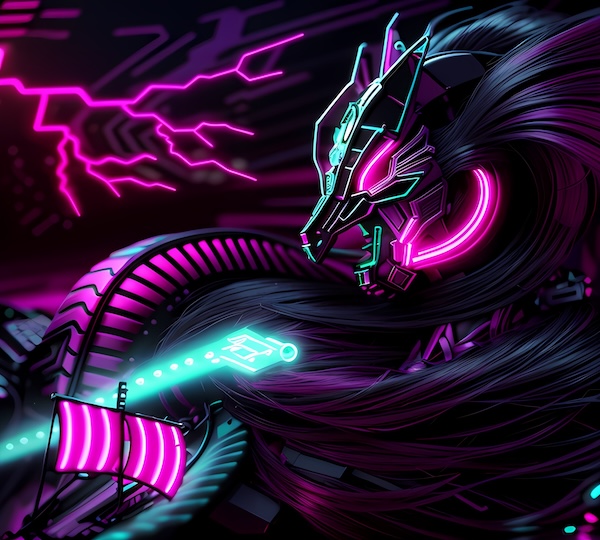
Mythic Ti’amat would come to pit herself in mortal combat against her children, the strongest and boldest of whom was called Marduk, a matricidal fire God and world-maker. Challenging his mother in battle, Marduk cast his net to enclose her, splitting her heart with an arrow just as she opened her mouth to swallow him whole. From Ti’amat’s dismembered body, Marduk created heaven and earth. The manifest world comes to be in one violent act of separation. Greene calls this Neptunian longing at work, evidenced in the struggle and necessity for independent existence, that great loathed ‘I’ represented by Noah’s Ark, the scaffolding of self against the great watery abyss we call ego. “The inherent duality of the pre- and post-natal world of the infant, part paradisiacal fusion and part terror of complete extinction, is vividly portrayed in Ti’amat,” writes Greene. Call it psychic unity, collective effervescence, or participation mystique – the story of creation, embodied by Neptune, is about the relinquishing of an unconditionally loving womb and breast, also the monstrous cosmic sea serpent, which must be destroyed and transformed if we are to develop a coherent sense of self-identity and purpose.

While Ti’amat’s death is an illusion, the global remembrance of her lives on in myths and stories of every culture, taking on a more savage and hideous face in the ocean-dwelling Canaanite figure of the hideous monster Lotan (Hebrew Leviathan), the torturous serpent equated with Lilith (The Devouring Shadow Feminine) of Kabbalistic myth, she who seduces men to follow crooked paths. In the Sumerian myth, one of the oldest recorded creation stories of all time, this world of waters began with the Goddess Nammu. As the Mother who gave birth to heaven and earth, her name was written with the ideogram ‘A’ for ‘sea.’ Associated with essence, fate, destiny – not only is the Sumerian word for water synonymous with sperm, conception, and gestation, the Great Sumerian Sea Mother is parthenogenic – both fertilizing sperm and moist, receiving womb. Androgynous and undifferentiated, her glory is primal chaos and unformed darkness.
In Egyptian myth, the primordial waters were called methyr, meaning ‘great flood.’ Symbolized as cow goddess Hathor, known as the ‘watery abyss of heaven,’ she was sometimes portrayed suckling the young Pharaoh to be. Sometimes called Nut, Net or Neith, she who gathers and pours down rain from the heavens; Egypt recognized the origin of life as a watery cosmic womb. Nut was even sometimes being portrayed in fish form, as she who is before fishes. A quick perusal of Irish, Scottish, Welsh and British folktales and legends evidences how here too water was married to an otherworldly element – fluid, mysterious and life-giving, also capricious and destructive. For the Celts, the water of springs was a prized source of healing and regeneration, not to mention the magic cauldron, which personified the healing properties of water.

Often depicted as a womb-shaped vessel carried by the Irish fertility god Dagda, the cauldron was akin to the water-mother herself, an infinite source of magical cleansing and purveyor of ritual immersion. And yet, like the ambiguous Creator/Destroyer, the cauldron held dual associations with both death and renewal. The same magic cauldron used to cleanse and heal was also used to sacrifice prisoners of war by slitting their throats over the holy vessel, when they were not drowned in a tub of water. The Celtic personification of water was called Danu by the Irish (Don by the Welsh), a deity whose dark face means ‘abyss’ or ‘great sea.’ In this culture’s rich pantheon of stories about mermaids, we can explore the duplicity of this Creator Goddess, life-giving and death-wielding, and the many magical, sinister and seductive qualities with which ancient Celts characterized water.
Liz Greene situates the Hindu concept of ‘Maya’ (illusion) in relationship to the Divine Mother as universe. With individual identity/ego experienced as a dream, the Hindu understanding of The Feminine Supreme and Divine Mother as all-encompassing and ego or ‘Maya’ (illusion) as meaningless, coincides with our modern conceptions of Neptune as a state of cosmic bliss. It is a grand domain within which one’s “personal feelings, needs, and values are rendered insignificant and even contemptible,” reflects Greene. Binding the human ego through the compulsive power of desire, here we find that we are not made ‘safe’ or even ‘good’ by rejecting desire. This too is a common Neptunian delusion at work, that is, the desire to be free of desire. In the Hindu cosmology, only through a profound recognition of the cyclical nature of the universe experienced over many incarnations can one begin to dissolve the veil of this great illusory Maya, who circulates through her creations in those magical substances – rain, sap, semen, milk and blood – endowed with the divine feminine’s generative and regenerative powers. And just as Hindus share the image of the lotus – divine solar flower of emergent life – with the Egyptians, they too envisaged water in the form of an endless serpent or ‘primal spiral’ stretching out over time and space.

How might there exist such a flexible interface between madness and union with the divine? Whether invested in the sanctity of sacrifice or the glamour of selflessness, it is often those individuals endowed with the most Neptunian of gifts that, while desperately wanting to actualize potential, hopelessly self-sabotage. Whether through over-giving or avoiding the sins of materialism to feel more holy, our sensorial fantasies of mother-immersion – of being soothed, lulled, refreshed, protected and cleansed into nothingness by her great wombliness – can very easily become a feeling of “incipient suffocation, the blind panic, the terror of something bottomless like a giant maw that will suck us down into oblivion,” writes Greene. Until we claim the creature lurking in the depths of the sea for ourselves, we find ourselves swamped, inundated, drowning, flooding, drifting and dissolving. For the most Neptune-resistant of all, the wake-up call of source will be even more forceful, sudden and destructive; like a big tidal wave that totally wipes us out.
In the lore of the self-fertilizing female creatrix, the prima materia, the oceanic absolute maternal power is both hard to fathom and hard to deny. In the ceremonial cleansing of the Christian Baptism. Certainly, in this inherent duality symbolized in the two fish of Pisces, Neptune’s ruler, domicile and space of greatest potency and ease. While modern astrologers often equate the Piscean fish with the predominant Christian motifs, long before that, fish were a fixture of Middle Eastern stories centering a great sea goddess. As a symbol, the fish is “simultaneously the phallus of the self-generating sea-mother, her voracious devouring mouth and the god-child that she bares and will swallow up again,” writes Greene. The smaller fish is the son, the bigger fish is the mother-goddess. Representing the animating and fertilizing power of water, these two fish, emblazoned in many a transcultural myth, represent the great duality or battle between the voracious hungers of the body and the redemptive longings of the spirit, bound forever by this unbreakable chain we call Neptunian dualism.

Let’s refresh. How did ferocious mother become Neptune, the male face unquestionably ruling the deep blue sea? After Poseidon was given the primal sea-goddess Amphitrite as a consort, like the lot of Greek deities, he gradually usurped her powers. Poseidon became the independent sovereign of the ocean, his trident symbolic of the teeth of the monstrous but de-fanged She—monster. Notes Green, Poseidon “rocking himself in his own flowing,” eventually merged with the local Neptunus of the Romans, whom the poet Manilius would later name guardian of the constellation of Pisces. Defending independent experience from the regressive pull of the womb, this is the perilous terrain of Neptune, “a devourer which must be fought, so that one’s reality can be sustained,” concludes Greene.
As one can imagine, the chaos and destruction of Neptunian dissolution are perhaps best exemplified in flood myths. The Biblical flood story, being based on the Babylonian, originally derived from the Sumerian. In this prescient story, even the gods cowered like dogs against the all-powerful female deity inaugurating the watery deluge. While the God of Genesis is male, it was Ishtar in the Babylonian story. In the Indian Mahabharata, the protagonist is Manu at the Holy River Ganges, very much a Hindu ‘Noah’ that predates biblical texts. When the fish begged Manu to release them back into the sea, they told him the dissolution of the universe was at hand, according to the turn of the great cosmic cycle. Manu was then instructed to build a massive ark, which he sailed amidst the terrible flood to follow. When the fish rose up from the waters, Manu tied a rope to its horns. As the sea devoured all of the land, creating a new universe, the fish towed Manu to safety.
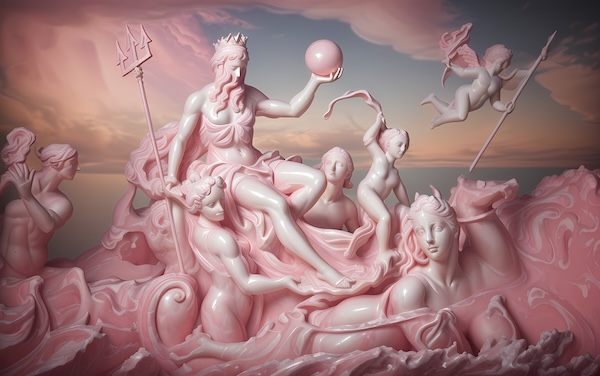
An integral role of all flood myths is this survivor figure, also an integrative aspect of Neptune and the redeemer half of the little fish. The small fish, which, as Greene writes, “stands apart from our identification with the oceanic source,” and can thereby save us from the threat of our own “primal emotional flood.” As the human progeny of the original sea-mother, here we find that the little fish that kills the mother is also the ark symbolic of the ego-container. Green notes that the ark is itself a paradox, “an image neither of repression (for it rides the waves, rather than attempting to damn them) nor of drowning (for it remains safely above the waters).” Within this mythology of the flood, we find the psychological seeds of Neptunian martyrdom, as the fear of flood transmogrifies into the hope of apocalypse. To the ‘sinless’ obeyers of God, the flood becomes a longed-for salvation. Here we find the body itself is, like the feminine dragon personified as evil, chaotic and wild, synonymous with the ‘beast from the sea’ which torments the faithful. Ti’amat is both our source of life and our instinctual felt nature, the piercing cry of our famished hearts.
In the sex-negative fashion of many a religion, Neptune’s longing to return to the paradise of mother fusion is fraught with feelings of guilt connected to the physical body and its lust for touch. And when this archetypal guilt comes to overwhelm the Neptunian, eroding any sense of self-value, “reunion with the source may ultimately involve the voluntary (albeit unconscious) destruction of the body – through illness, addiction, or even death itself,” informs Greene. In her book, she suggests that the story of Adam and Eve’s expulsion from Paradise Garden is symbolic of the act of physical birth. Sexual desire having no place in Eden, here we find that Neptune’s ‘romance’ precludes physical intimacy to romanticize the profound sadness of exile, the reality of the loss of Eden (the womb), and the harshness of the Saturnian world. For those with Neptune-dominant in their chart, it’s not so much about the death-wish, but of this desire to be unborn, this cryptic and wordless knowledge of the unbearable pain of separation from the source. Neptune’s longing failing to recognize otherness, just as the infant does not court the mother’s breast, it simply assumes a continuity and fluidity of shared space, presence and bliss. Lest we forget, even Eros, derived from ‘erotic,’ was not a god of fornication but an embodiment of the binding and unifying cosmic force. Ask yourself, are you ready to face life alone and rely on your own inner resources?
Fast forward to Elizabethan England, wherein ‘hell’ became the new slang for female genitals. Hysteria became the trending malady of the feminine soul whose cure was orgasmic and yet binding, an entrapment within the auspices of historically specific solutions designed by and for men. The word passion itself linked to hell (from the Latin ‘passio’ to suffer), in the Western mythic imagination, hell is imbued with the language of the deprived infant. Unending thirst and hunger, roasting, beating, piercing, tearing and freezing, humiliation and shame, loneliness and unending darkness – hell is the mother who denies us, leaving us to the misery of our unfulfilled needs. Paradise, on the contrary, is the memory of the eternally loving mother of our pre-birth fantasies, both of which are embodied in Neptune, alongside our energy of longing and quest for redemption.
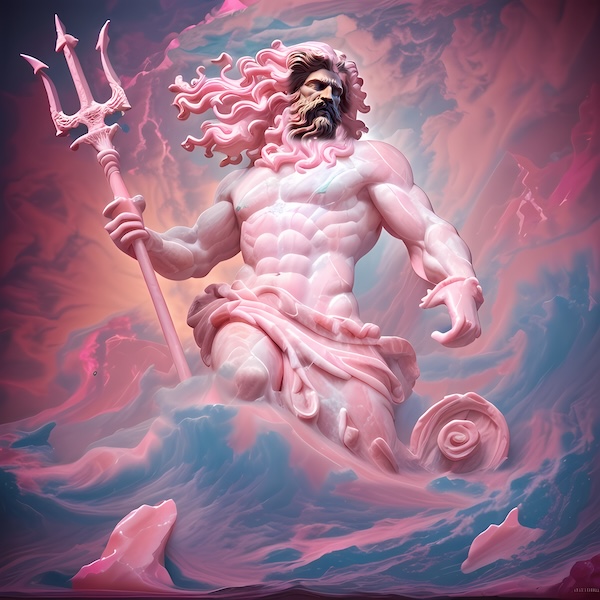
Why is Neptune the ‘Great Redeemer’ of the zodiac? If we consider that ‘redeemer’ comes from the Latin word redemptio (the root of ‘ransom’), we begin to understand this implication that to be classically redeemed is ‘to buy back,’ that we are presumably in debt to our creator. The key to understanding revolves around the acknowledgment of a shared origin, hence the Neptunian bliss of psychic unity, of love’s higher octave. Hence, the reality that in our very human attempts to commit a Neptunian flight from the agony of living in a body, we also generate an image of redemption unmistakably stained by our physicality. Call it the celestial snake biting its own tail, the despair after the drunken binge, the death by drug overdose. Neptune’s rejection of instincts is no sacrifice – only an attempt to cheat that which one cannot escape. Body avoidance, like a self-inflicted amputation, is another typically Neptunian shadow and one that wears infinite masks. And yet, what it signals at a deeper level is an inability to value life or oneself. Hence, the two fish, swimming in opposite directions, bound by blood, devour each other endlessly. If it’s all really so fluid, why must we dress our myths up with matricide and incest, violence and betrayal, no less, intrigue, love, romance and the glitter and glamour of fantasy?
With Neptune’s characteristic dynamics of projection, one’s chosen redeemer figure often arrives in the form of a glamorous film star, guru, political leader, pop musician, fashion model, mother, child or lover. Here we find that sensual pleasure and relationship is NOT Neptune’s aim, but rather a release from loneliness and exile. We idealize, lifting off into that sense of exaltation close to oblivion which accompanies merely being in the chosen one’s presence. Nostalgia for an idealized, perfect lost love against whom no one on Earth can compare (aka selecting your soulmate from the ranks of the married, avoidant, or otherwise unavailable) is a classic Neptunian defense. Lurking within the transpersonal planet’s darker underbelly, one finds the intersection of the redeemer exalted with the redeemer torn apart. It’s why Catholics ‘eat’ the body and drink the blood of Christ at Mass, why we idealize our parents in childhood only to despise them for the very same reasons as a teen.
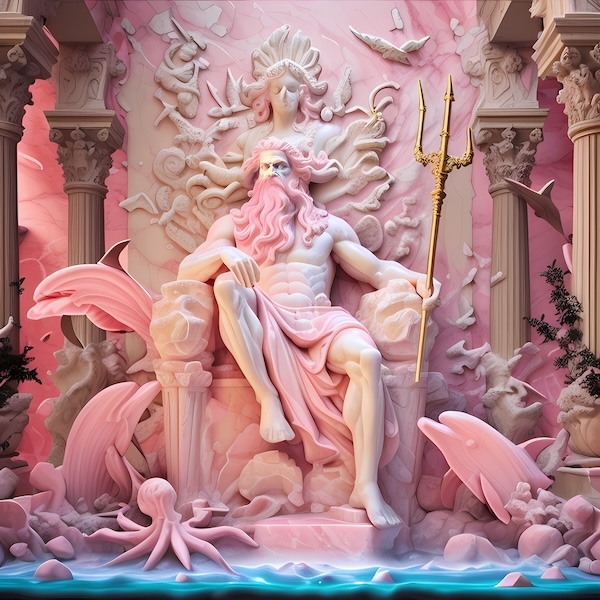
A quick survey of cultural redeemers from the Piscean age – Christ, Dionysus, Osiris, Shiva, Attis, Orpheus, Mithras – reveals these figures were martyred, crucified and/or devoured. The earthly Titans consumed the flesh of the light-born Dionysus, thus impregnating the human race with the divine spark. The dismemberment of Orpheus, Dionysus, Shiva and Osiris. The slaying of the Mithras-bull and the castration of Attis. The edibility of God symbolically enacted in the Eucharistic feast. Beneath the more civilized rituals of mass lurks the former sacrifices of the slaughtered beast, and prior to that, the slaughtered man or woman, honorably the King himself!
In Christ’s Crucifixion, we can source another very ancient and mythic motif associated with the cross as a symbol of being ‘nailed’ to the Great Goddess, an image of spiritual paralysis as well as an escape from the sins of the body and from earth experience itself. In Teutonic lore, the God Wotan hung on the World-Tree Yggdrasil. Here we recall the Tree of Life found by Gilgamesh at the bottom of the sea, and of course, Eden’s Tree of Knowledge. The Hanged Man of Tarot. By whatever name, the redeemer pinned to the cross, represents the abandoning of bodily gratification in the hopes of salvation. The cross, of course, representing cardinal Earth, Time and Saturn, is also symbolic of the four directions. We observe its ancient meaning hidden in the colloquialism of having a ‘cross to bear.’ Embedded in the archetypal Neptune is this desire to dismember and devour those who “seem to carry the spark of the godhead,” informs Greene. A more disturbing feature of Neptunian longing is that dreamy idealizations take on a voracious quality, wherein we speak of a beloved as good enough to eat. “Here is the mouth of the big fish, ready to swallow the redeemer which she has created out of herself,” writes Greene. The great Neptunian duality indicated in the body that imprisons the soul versus the soul, which seeks reunion with its divine source.

Many speak of Neptune’s healing powers and their longstanding role in ancient medicine and religion. Neptunian ecstasy has many faces, from the most disrobed of emotional states to the embodied ecstasy experienced during indigenous ceremonial healing and initiation rites. Neptune, overseeing the full spectrum of ritual therapeutic practice, at the climactic transpersonal level, the planet wields the power of mytho-poetic hypnosis, being more than capable of lulling the masses into cathartic trance. Attuned to the ‘higher octave’ of transpersonal love, Neptunian ritual adornment, chanting, music and dancing fuse the community together as a psychic whole. This essential breakdown of the barriers of individual ego-consciousness, in a healthy individual, happens responsibly by way of ritual rapport created between healer, patient, community, and potentially, God. As the alliances of doctors, therapists and medicine keepers have greatly shifted with time, Neptunian elasticity produces new varieties of ecstasy, alongside new diagnoses and new drugs.
Dressed up in the shop-talk of the day, new eras call for new maladies: manic depressive psychosis, schizophrenia, functional autism, epileptic personality and eating disorders are all variably linked to Neptune’s out-of-body experience in Liz Greene’s book. While ‘hysteria’ is an antiquated term, it’s not an unfit umbrella for the vast array of Neptunian dysphoria. We now understand that many physical ‘symptoms’ are rooted in underlying unconscious feeling states. But for the hysteric type, not only do symptoms follow fashion, they involve a bit of play-acting, notes Greene. While it often occurs behind closed doors, Neptune, as we know, has no limits; its powers of perversion and pitches of ecstasy are boundless.
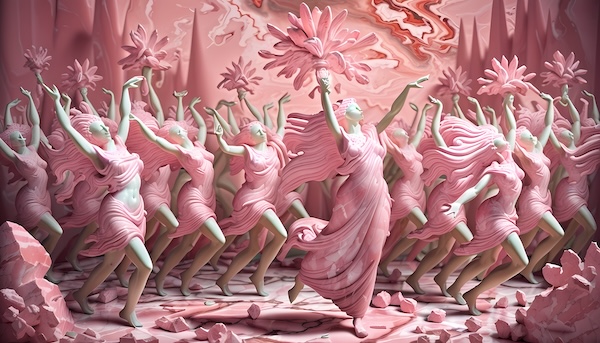
The Greeks are well known for putting those most classic, highly theatrical manifestations of hysteria – disheveled hair, head tossed back, eyes rolling, body arched and tense or writhing – to work in the theater. Agreeably erotic in origin, even if hidden beneath religious fervor, these types of physical displays sashay through the dustbin of Neptune’s most alluring provocations, signaling sexual excitement and ecstasy, yearning, liberation, striving toward fusion with powerful fantasy figures, even mirroring the act of childbirth itself. In Euripides’s The Bacchants obedient housewives and mothers under the rule of an all too Saturnian King become Maenads gone mad. Intensely frustrated with their conditions, channeling the androgynous ‘ecstasy of god,’ the Maenads rise up to leave their children and ‘women’s work,’ going to battle with and defeating the male oppressor. Involved in the Maenad’s castrating and vengeful fury is the tearing of young animals to smithereens and the brandishing of a giant phallus.
As they run amok, their ruling King threatens to capture them back into their previous state of domestic servitude, only to lose his head (symbol of his rationality). The Greeks, writes Greene, “recognized hysteria as the condition par excellence of large-scale and continued repression.” Literally dancing their demons out, the Maenads en masse demonstrate the regenerative experience involved in the release of pent-up emotion. What heals the soul when properly channeled (as numerous danced folk religions illustrate), in modern times, often gets catalogued as either psychosis, art or religious experience. When did repressed emotions converted into bodily symptoms vaguely symbolic of the root conflict become complex diagnoses designed with profitable cures in mind? Euripides writes, “Do not be wise in your own diseased imagination. Welcome the god to the land, pour libations, wreathe your head, revel.”

In the face of these most archaic longings, the ego, depending on its solidity, grows more or less porous and diffuse. The Greek roots of ecstasy, being ‘to be beside oneself’ or ‘to be out of oneself,’ highlight this very experience of nirvana, the state of psychic unity in which the ‘I’ no longer rules. In Hippocratic texts, the womb itself was said to ‘wander’ throughout the female body, making mischievous music in the form of mood swings, laughing, weeping and rage. The original sins of the body notwithstanding, when we have good enough parents, we find that the Neptunian force can often hang its hook on a work of art, or on the replenishment offered by spiritual community. If the early childhood experience was found lacking, and no solid ‘I’ could be formed at the developmentally appropriate stage, the result is more along the lines of the Neptunian shadow in the form of “compensatory fantasies of a state of fusion which was in actuality denied, abused, or curtailed abruptly, and violent rage at having to leave Eden too soon in exchange for permanent loneliness and deprivation in the outer world,” writes Greene.
Evidenced in the erotic precocity of the hysteric, Neptune’s longing for mother is sensual. And yet, not to be confused with Venusian romance, Plutonian sexuality, or the Martian flood of hormonal lust. We cannot simply call Neptune transcendent and the personal planets coded as ‘masculine’ selfish, although popular astrology often does, denying the value of self-actualization, self-assertion and self-preservation they afford. Apparently incapable of uttering ‘I,’ in our collective amnesia around Neptune’s true form (usually stronger and more hypocritical within esoteric communities), we have generated a whirlpool of sin around the word ‘selfish,’ despite its essential value to our self-worth and autonomy. Here again, we participate in the polarization of wisdom teachings, naively assuming it is either a matter of ascending into cosmic bliss or descending into psychic disintegration. If we uphold this binary, refusing the Saturnian ark (while boisterously choosing to mount the Neptunian or Uranian rocket), what it usually boils down to is a failure at self-containment, often referred to as spiritual bypass.

Greene writes how very often when we surf the tides of Neptune, “almost any emotional experience is permissible except the dogged and dreary process of remaining inside one’s own skin in the face of turmoil.” Whether we are self-inflicting or deflecting our Neptunian suffering, often at the archetypal core lie the twins of human feeling we call guilt and shame. Take classic Neptunian masochism, for example. Falling in love with self-generated misery (deeply enmeshed with the Christian ethos), here one’s suffering serves as a defense against the consequences of one’s rage. Self-inflicted pain provides the illusion of choice. Rather than interpret life as a veil of tears or a whirlpool of misery, the fact remains that healthy, integrated Neptune must learn to accept reality as it is, not as we wish it or will it to be.
Paradoxical as it may seem, Greene highlights how Neptune’s paradisiacal urge is “not only our primary narcissistic compulsion,” but equally, “our highest ideal.” Perhaps it’s why we idealize mothers and yet fail to clearly or fairly compensate them for their labors. Much like art, acts of service and serenity often evade the realm of commerce, but at whose expense? Neptune’s premium channels – love and art – seem to remain outside the bounds of definition, and are thereby excused from the continuum of value we put on those things which take a more clear, predictable form.
Madness isn’t a cure or a guarantee, merely one possible result of attempting to exclude Neptune’s yearning from our conscious awareness. Whether you’ve found god in the strobe lights at the discotheque, in the binaural beats of the underground festival, or let a new lover push your Eden-button, we all require that our yearning for the divine be appeased eventually. Whether it’s more or less ritualistic or Dionysian, religious or psychotropic, the twilight of the mind beckons with its overwhelming, otherworldly call. Human beings have been coming together in communion to lower the threshold of consciousness since the beginning of time, what we can call Neptune on a mass level.
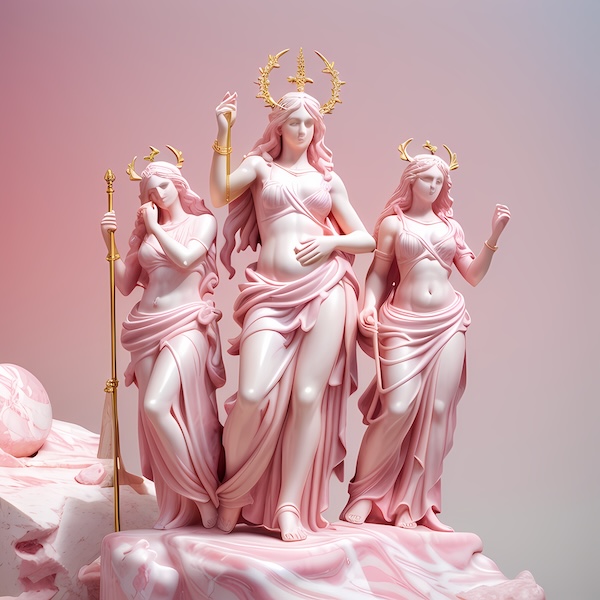
In a natal chart, Neptune symbolizes the longing to return to the Source, the ‘reality’ beyond the veil. Likewise, the house in which our Neptune resides highlights not only how we seek redemption but also those areas of life in which we will be experiencing unconscious projections of it. As Neptune renders our boundaries porous, and the collective psyche seeps in, we instinctually fear the devouring serpent that is Mother, clinging to the succoring figure who will intercede on our behalf, also Mother.
Whether we are inclined to flee the flood or fight the mother is both a matter of will and cosmic potentiality. Which is precisely why our Neptunian dreams constellate as easily around themes of flooding as paradise lost, the sanctuary of infancy, and the watery unborn state. While Neptune has a world-view no more or less archetypal or spiritual than any other planet, having emerged from the womb of wombs, how seductive is its study – the scroll of our lost perfection, the gap between reality and omnipotence. Wherever Neptune is placed in our natal chart, we are both redeemer and redeemed. It is where we save those victims that are secretly the inheritance of our souls. If we can grow to create a positive, life-affirming shift in perspective, the natural result is our own radical sense of belonging. Caretakers of our own narratives, we become transformed at the crossroads of the sacred and mundane.
In essence, Neptune’s many-headed daimon of longing invites us to embrace the full spectrum experience, to dance with our shadows, and to rise from the depths with renewed purpose. Ending and beginning of the cosmic cycle, in Neptunian ‘undoing’ lies the birth of our new ‘doing.’ With Neptune lifting off recently at 0° in Aries at the top of a kite figuration crowning a grand Air trine involving Pluto in Aquarius, Sun in Libra and Uranus in Gemini, it is one of those rare moments in life when the slate has been wiped clear. Timelines and soul contracts are being released; self-sovereignty is up for the taking. We are at the starting point of a new era, and with Neptune in Aries for the first time since 1875, each and every one of us is hearing our own uniquely instinctual and personal call to the cosmic renaissance. In doing so, we transform longing into a recalibration and rebirth — an anthem for the divine waters that flow through us all.

If you don’t already know the sign and house of your Neptune at birth, you’ll need to download a free natal chart HERE. To illuminate Neptune The Greater Redeemer, locate the glyph symbolizing a trident. Read on for personalized insights on the She-Monster of Undoing through the zodiac, with healing Neptune Rx prescribed by Midheaven Or Nah.
Neptune in the 1st *Big Empath Energy*
Celebrity Doppelgänger: Bjork
Dreamy, intuitive and misunderstood, everybody likes a rising Neptune! Embodying the magical fascination of the mermaid, one aims to please. Creative and visionary, Neptune in the house of self fosters a vivid imaginative faculty focused on creative pursuits and inspirational ideals. Blessed with subtle diplomacy, one navigates rather than shapes the outer world. Merging with others in an ecstasy of mutual pleasing, maybe it’s as if every interpersonal interaction becomes a potential experience of salvation, no clarity and judgment needed! Adaptable and charismatic, fluidity of nature allows you to easily adjust to various situations, drawing others in with compassion and charm. When your trusting nature doesn’t make you susceptible to exploitation, it makes you a gentle and caring giant. Recognize that your sensitivity is a gift, not a weakness. Struggles around identity, boundaries and vulnerability to manipulation are life themes. Endowed with a personality like magic, psychic gifts allow you to perceive the intangible, unseen worlds. Seek environments that honor your empathy while providing stability and support. Learn how to shield yourself from negative influences by developing cleansing and grounding practices.
The shadow territory? Old astrology texts cry blindness and self-deception, hypersensitivity, confusion, aimlessness and physical ailments. Self-assertion involving the risk of alienation and loneliness may be strenuously avoided, if not exhibited unconsciously in the fierce demands of illness or addiction, which eventually require one to be taken care of. Get to the root of the rage lurking beneath physical ailments, which is likely a chief factor in their cause. Perhaps one adopts a strange fatalism, as though life is unreal anyway and therefore not worth struggling with. Eschewing personal responsibility might undermine all efforts to establish a coherent life purpose. Deciding that everything is ‘meant to be,’ 1st house Neptune can be extremely manipulative, securing fusion in patterns of victimization, playing the passive role in a series of toxic relationships. The more directness and honesty achieved, the more Neptune’s characteristic sensitivity and magic come out to play.
Acquiring power through enchanting, pleasing and mirroring the emotional needs of others – one might be a famous actor that woos the masses, only to find that chameleon-like tendencies have obliterated any self-understanding. One can become addicted to the adoring public’s attention, driven by a tyrannical need to replenish the supply. The tragedy lies in a lethal tendency to identify almost totally with the archetypal image projected upon you by others. A healthy dose of self-value and self-preservation is crucial. One might be a gifted counsellor or healer, with a unique capacity to enter the feeling states of others. Just don’t let a need to be needed lead to overworking, undercharging, ignoring personal needs, and building up an enormous, albeit unconscious, reservoir of anger and resentment towards demands you cannot refuse.
Rx: STRAP1 POWER SPORTS BRA
The 1st house, ruled by Mars, reflects an individual’s sense of potency and effectiveness in life. The nature of Neptune being at cross-purposes with power-thirsty Mars, Neptune in the 1st entails a dilemma. Mars seeks to assert its powers over life, and Neptune seeks to avoid birth. Rather than let this conclude in learned helplessness, or a state of feeling overpowered by forces beyond one’s control, develop the inner solidity to swerve past the waters of oblivion into the waters of life. Only then can you truly honor the rich and magical gift that is Neptune Rising. On that note, reclaim your sovereign status with the STRAP1 POWER SPORTS BRA by Nusa. Delivering the perfect balance of strong support and soft comfort, elegant straps and a sleek racerback enhance the appeal of the sports bra’s signature power fabric. Clinging to the bosom while feeling light as air, it’s Neptune-approved with the reflective Planet Nusa logo, affording effortless movement and all-day wear. From the female-founded, community-driven active wear brand out of Copenhagen, Nusa is leading the pack when it comes to creating more inclusive spaces in the industry. Say goodbye to fast-fashion and hello to openness, honesty, and care; at Planet Nusa, transparency and diversity are by design.

Find it HERE
Neptune in the 2nd *Idealism or Disillusionment?*
Celebrity Doppelgänger: Vi Redd, American Jazz musician, vocalist & educator
The 2nd house of material autonomy is tasked with the formation of personal values, which provide inner stability and continuity. Money being the primary collective symbol of self-value, the price we put on what we produce is also the price we put on ourselves. Striving to forge a more solid sense of ‘I’ in the house of Venusian fixed Earth, Neptune gets murky and awkward. Material autonomy standing in opposition to Neptune’s boundarilessness, this placement is typically associated with financial hurdles. Chronically struggling with the material demands of life, money problems are merely a symptom of the greater sea of Neptunian feelings. Avoid get-rich-quick schemes, proceeding with caution in financial dealings, as one could easily be misled. A strong sense of non-attachment to material possessions coupled with a realization that material wealth doesn’t necessarily equate to happiness (or success!) is key. Caution around overspending based on emotional or artistic whims. If self-worth is tied to external validation or emotional needs, rather than internal strength, there is a potential for feeling victimized. Perhaps one complains of being had by a mercilessly materialistic world, yet undermines one’s skills in collusion. As if reverting to an infantile state mirroring the baby who assumes the availability of food and protection, suddenly one finds that someone else ends up paying, if not the taxpayer in a welfare state.
There is often a profound sense of empathy with those who truly cannot cope, matched by 2nd house Neptune’s willingness to freely share resources. Both a measure of heartfelt generosity and a subtle reenactment of the mother-child symbiosis, one may not actually want autonomy, which frees one of the sins of materialism, sensuality, greed and envy (the darker face of Venus). Neptune in the 2nd seemingly grabs these benefits guilt-free! Exhibiting an instinctive sense of the oneness of all life, one needs to secure a meaningful vocation. Are you working hard enough to put your gifts into marketable form? Or is lurking beneath ‘failure’ an unchecked Neptunian helplessness, a deep-rooted belief that one does not deserve comfort and wealth?
House of talents and resources, 2nd house Neptune reflects a capacity to develop self-worth and independence through the practical expression of imagination and psychic unity. Neptunian eroticism and sensitivity finding their healthiest expressions in the arts, keep in mind that Saturnian discipline is required! Create a healthy alliance with Venusian self-appreciation to avoid financial victimization and the pain of unexpressed or unrecognized talents. Caution around unconsciously devouring those whom one perceives as selfish or greedy. It is not a good idea to become above such base needs as money, which places the responsibility for getting one’s hands dirty on someone else. One may attract resources in unusual or unexpected ways. Dream big, but remember to fortify the foundations of those dreams with practical steps. Zero in on creative careers that align with Neptune’s fluidity and grace.
Rx: The Zodiac Light Oracle
As you aim to focus on your intrinsic value, cultivating an unshakeable sense of self-worth free from external factors, make sure to integrate spiritual values with practical money management. Rather than swinging from idealism to disillusionment, balance creative aspirations with strategic planning. It need not be tedious, nor conclusive. When 2nd house Neptune interferes with boundary work or self-worth, try using a gentle divination tool such as this oracle deck based on the Nakshatras of Vedic Astrology to filter feelings and experience in pragmatic ways. Calling on the ancient wisdom of the rishis to encourage personal discovery and purposeful transformations, authors Victor Daniels, Ph.D. (a psychologist) and Kooch N. Daniels, M.A. (a professional intuitive) draw on extensive years of study to create a deck traversing the 27 lunar mansions of Vedic astrology. Enhanced with striking illustrations by artist Pieter Weltevrede, these cards are designed to open the mind and heart to greater joy, creative expression and clarity. Use it when you need simple answers to the complex questions of daily life, anchoring back into a healthy balance between inner knowing and outer synchronicity. Accompanying The Zodiac Light Oracle are instructions on ways to work with various five-card spreads as well as how to chart a horoscope using the cards. Learn more at awakeningthechakras.com
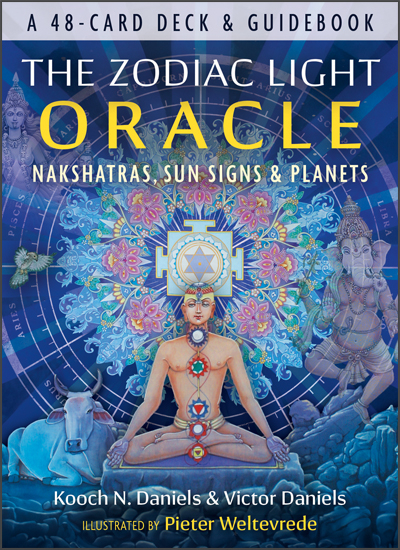
Find it HERE
Neptune in the 3rd *Romancing the Source*
Celebrity Doppelgänger: Dame Barbara Cartland, best-selling British romance novelist
With an intellect at once imaginative, sensitive, and prone to escapism, 3rd house Neptune signals heightened intuition, a strong connection to language/symbols, and creative expression via writing, speaking, or media. In the 3rd, as the formulation of autonomous inner experience releases the individual from the secret container of the womb, the light of separate identity begins to shine, streaming as it does in the magical medium of (verbal) communication. Here we find a vague inarticulateness often characterizing the 3rd house Neptune (frequently misinterpreted by educators and pharmaceutical companies as a lack of intelligence or poor concentration). In fact, it’s more likely a powerful, albeit unconscious effort to prevent the separation generated by words and ideas. Perhaps showing up as a type of absent-minded evasiveness, this individual commits to memory only that which won’t destroy the established or desired fusion, reluctant to cause distance or discord. Sometimes extending to outright duplicity, Neptune in the house of communication might just moonlight as an elegant liar, albeit not in the calculated or self-serving sense. Either way, communication is an area where Neptune’s murky influence is palpably felt.
One’s mind offers a bridge to realms both seen and unseen, opening doors to an expansive universe others overlook. And yet, putting the intellect purely in service of idealization often leads to disappointment and disillusionment. Caution around difficulties with clear communication, vagueness or lack of clarity, poor time management, absent-mindedness, or a tendency to over-idealize one’s surroundings. Preferring that grand Neptunian smokescreen, perhaps one formulates vague ideas about the evils of the intellect, heaping contempt upon those who value clarity. The life-enhancing ingredient? A dash of Mercurial insight, Messenger Planet Mercury being the natural ruler of the 3rd. Without it, Neptune’s longing undermines clear communication, making one seducible and seductive, with the dialogue exchanged rarely honest. Talented at implying and inferring, both of these tactics, as well as words themselves, can wound deeply. Easily disowned or disclaimed the next day, on the grounds that one is misunderstood, Neptune in the 3rd eventually feels victimized by others’ misunderstanding. When isolation and loneliness are the unexpected results of this willful inarticulateness, one may await an elusive redeemer who can understand without words. Neptune’s gifts here range from a photographic memory to considerable talent in poetry, storytelling, vlogging, podcasting, public speaking, writing or content creation. Bestowed with a rich inner world and powerful imagination, one excels in creative fields where imagination and storytelling are prioritized.
Rx: Head Lab Scalp Scrub
Fancy dreaming the unpleasantness away? While the allure of fantasy can be formidable, withdrawing from reality surely backfires. According to recent evidence from the medical field of psychodermatology, there is a two-way relationship between mind and scalp. With Airy, 3rd house ‘neuroticism’ linked to psychological stressors like anxiety and depression, the resulting symptoms can often directly affect scalp health, worsening conditions such as hair loss, dandruff and inflammation. Which is why your Neptune Rx is this deeply exfoliating and refreshing scalp scrub by Malibu C, a company celebrating 40 years of wellness. Your best bet for soothing relief and circulation-enhancing medicine, it’s perfect for chemically treated hair and free of harmful additives such as parabens and sulfates. A clean, vegan alternative to conventional treatments, Malibu C is your standout purveyor of nature-inspired vitamin technologies, ideal for antioxidizing hair and skin!
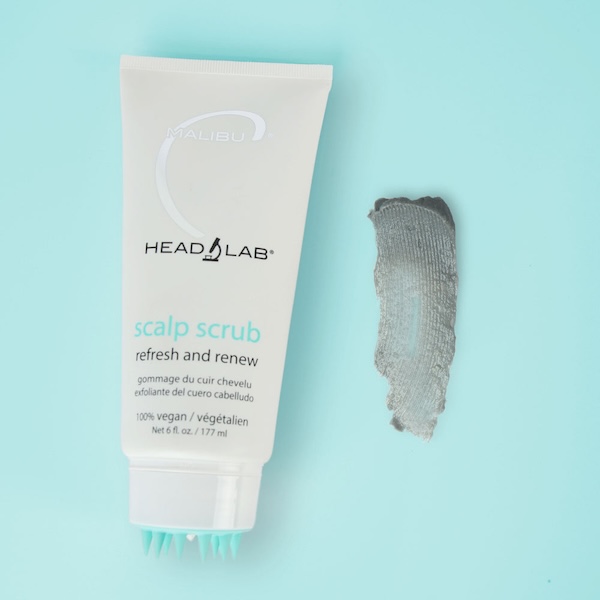
Find it HERE
Neptune in the 4th *Roots of Psychic Security*
Celebrity Doppelgänger: Jessica Alba
4th House Neptune suggests home life is centered around idealism, sensitivity and spiritual sanctuary. Fostering creativity and compassionate understanding, Neptune’s influence can bring a heightened sensitivity to the spiritual/psychic realm, which greatly impacts domestic life. Often, a sense of emotional security feels elusive. Perhaps you use your home environment as an escape from the harsh realities of the world, or there are difficulties with emotional stability amongst family members. Strive to perceive family members with clarity, approaching potential shadows with compassion and openness. Fostering a nest or landing pad where truth and vulnerability are embraced, create safe spaces for expression, which can transmute ‘secrets’ into wellsprings of mutual understanding.
Is the victim-savior dance coloring your emotional attitude towards your Father of origin? Do unspoken rules, hidden emotions, or undisclosed histories shape domestic life? Childhood may have felt complex, often due to an especially sensitive, absent, preoccupied, or chaotic parental figure. Idealization is often the result. The elusive qualities of Neptune, perceived in the parent, unconsciously mirror back to the individual the magic of paradise lost – even if these feelings stay submerged below consciousness. There is often a great sadness around the experience of the father who seemed unavailable or uncommunicative. Alternatively, one may feign an attitude of anger or disinterest. If the quest for a spiritual home in the form of a father surrogate – often a guru or spiritual teacher – is carried out without any recognition of the role the personal father plays in the longing, the result is disillusionment. Maybe this plays out in desiring partners who are already married or otherwise unavailable. Perhaps one compensates for parental disappointment with disproportionate feats of strength and displays of rationality. Don’t let inflated expectations around home life interfere with developing a more grounded perception. It may feel challenging to set clear boundaries, potentially leading to enmeshment. Set limits if you start to feel like a doormat or martyr.
Perhaps one simply feels plagued by a sense of rootlessness; no physical abode is home, to no city or country does one belong. Don’t let divine discontent make of you a wanderer who travels everywhere and settles nowhere, one whose unfulfilled dreams of finding the perfect home still dominate the life force. At best, one can transit this longing for home into a force that opens doors to a sense of connection with all life. With a natural ability to generate a lunar experience of closeness with others, perhaps it is ultimately the creation of a chosen family that offers a more reliable way to experience the reality of ordinary human support and affection.
Rx: Aqua Marine Deep Serum & Relief Cream Mist
Associated with roots, home, family and ancestral background, the 4th is traditionally correlated with both the personal and archetypal Father. Viewed through the lens of myth, the Father archetype signifies the divine spark that animates the body from within. Just as the biological body is self-regulating, the IC’s root of the astrological tree, overlapping with the 4th house, contains characteristics of the self in stable form. With Neptune here, the call of redemption is linked to father-wounds and the male face of primal chaos. If you’re looking for skin replenishment amplified by aquatic proportions, check out the latest from Dr. Althea. Because nothing screams Neptune of the deep blue sea like mist and aqua marine. Two cornerstones from K-Beauty’s favorite eco-friendly, vegan certified brand, Aqua Marine Deep Serum and 345 Relief Cream Mist are your key to combating seasonal skin dryness and irritation due to decreased humidity in the Fall air. With patented hyaluronic technology, the premier Aqua Marine Deep Serum delivers potent active ingredients for long-lasting hydration, formulated with bambusa vulgaris water. Added panthenol locks in the moisture barrier in this highly soothing serum designed to calm the impact of external stressors on sensitive skin. With an enchanting aqua marine color derived from all-natural ingredients, patented hyaluronic acid technology powers up like the fountain of youth.
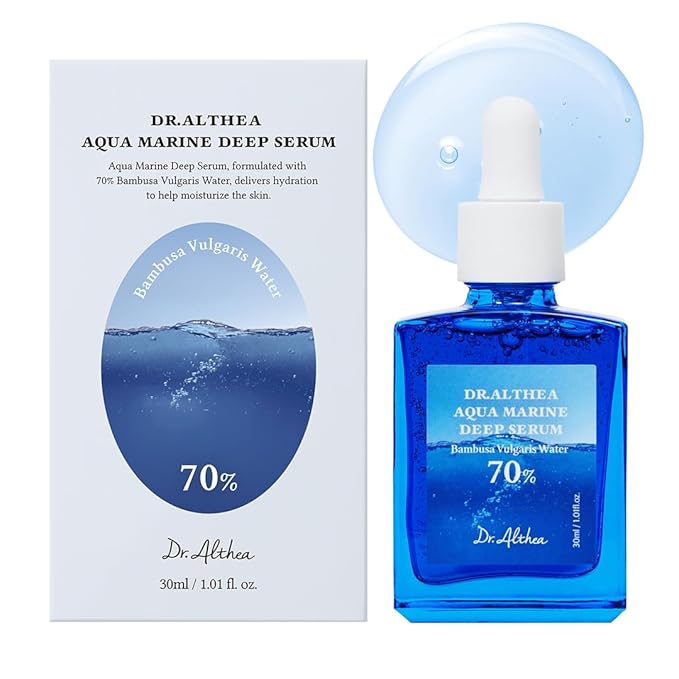
Secondly, make sure to test a spritz of the 345 Relief Cream Mist, the latest cult-favorite of K-Beauty fans everywhere. As a refreshing dual-layer mist designed to deliver instant hydration, it’s perfect for sensitive and redness-prone skin. Combining the hydrating power of a toner and the moisturizing benefits of a cream, this innovative, ultra-fine spray delivers serious hydration without the heaviness or stickiness. Formulated with Dr. Althea’s signature 3-4-5 formula, a trio of hyaluronic acids affords deep, long-lasting hydration along with 4 rice-derived extracts and soothing botanicals like centella asiatica and aloe vera. Meanwhile, added rice bran water enhances moisture retention and strengthens the skin barrier. All Dr. Althea products are free from artificial coloring, fragrance and parabens.
Find the Aqua Marine Deep Serum HERE
Find the 345 Relief Cream Mist HERE
Neptune in the 5th *It’s Gonna Take a Miracle*
Celebrity Doppelgänger: Deniece “Niecy” Williams, Grammy Award-winning 80’s R&B Singer
5th house Neptune signifying a strong spiritual awareness and connection to the divine, one takes a dreamy, imaginative approach to life. Whether exercised via creative expression, cosmic sexual union or the hall-of-mirrors pleasure labyrinth of doom is on you. It’s crucial to find healthy creative outlets, as the highest potential here is harnessing artistic pursuits for the purpose of spiritual fulfillment. Driven by an urge to play and spontaneously express one’s childlike heart, the most redemptive experiences encountered in the 5th are an expression of inner divinity. Also known as the house of love, our 5th house ‘love affairs’ show us how, through our capacity to love, we glimpse that which is godlike in ourselves. Neptune in the 5th conjures the love of troubadours, for whom the beloved is a sacred mirror, the experience of passion a gateway to the infinite. Neptune wearing rose-colored-glasses in love, exercise caution when relationships leave you feeling confused, distant, non-committal or dependent. When the drama turns everything sour, stick to your ideals without expecting too much from ordinary people. One risks becoming drunk on a love of beauty and art, wastefulness, self-glorification, misdirected passion or seduction. Idealizing love to a fault, this Neptune lacks discrimination. Utterly in love with being in love, suffering and love often coexist side by side.
Alternatively, some 5th house Neptunes will project the sacred victim-redeemer drama onto the domain of parenting. And yet, children are not merely extensions of our solar creative power, but individuals in their own right. Whether idealizing children to the degree that one unconsciously obliterates them, or playing redeemer to a seemingly helpless or victimized youth, it is most often the parent who secretly seeks redemption in the form of a child’s unconditional love and dependence. Maybe this placement looks like an accidental pregnancy, as Neptune’s poor boundaries often create unconscious love affairs. Pregnancy can become an instinctive means of binding a partner, and yet any relationship built on such a foundation is fraught with entrapment, bondage, and victimization. Here we find that beneath Neptune’s inclination to bow to mysterious karma is often a pattern built upon unconscious choices and unacknowledged longings.
Is martyrdom really the righteous path? As if suffering were the passport to paradise? Parenthood itself may be perceived as a type of burden and proof of loving self-sacrifice. Creative outlets are essential as real people (lovers, offspring, etc) fail to fulfill the mythic proportions of Neptune’s idealizations. Initially, for most, the instinctive acts of the 5th, which require less reflection (a love affair, love child, or speculative act, hence the house of gambling), seem easier to manage. Successful creative work, on the other hand, demands the discipline of Saturn and the self-definition of the Sun, which Neptune naturally resists. Paradoxically, it is through said creative efforts and in discovering the divine child within that Neptune’s redemptive longings can at last be fulfilled. With a radiant aura that captivates, channel creative self-expression in ways that benefit the community, transforming your unique vision into a source of joy and enrichment for all.
Rx: Liquid Gold Enriching Elixir
In the house of royal sins, you are here to flit above the sacred drama like a monarch butterfly spreading its wings, to channel godliness like a regal beast. The 5th house’s archetypal image of the ‘divine child’ symbolizes the specialness of the Sun, natural ruler of the 5th. Creativity allied to a 5th house carrying with it a direct, unmediated experience of the divine, it is essential to stay grounded and (humble!) enough to truly ‘hold court’ in such royal of Neptune placements. Introducing Liquid Gold Enriching Elixir, the all-in-one beauty oil for face, hair & body. A highly nourishing formula designed to repair, protect and soothe, its Illuminating properties work wonders on skin and locks. Blended with rich fatty acids, vitamins, and minerals to protect against free radicals, the unique blend is formulated to inhibit the key stress signals that contribute to cellular aging. Keeping skin plump by suppressing transepidermal water loss, Liquid Gold Enriching Elixir is available solo or as part of a mini trio set, which also includes KERACELL® Anti-Aging Hydrating Mist and the V-Shape Neck & Décolleté Cream. From the company that has revolutionized skincare with a premier stem cell technology developed by two Ph.D biomedical scientists, KERACELL® products are prized for delivering unparalleled skin firmness, wrinkle reduction and cell vitality.
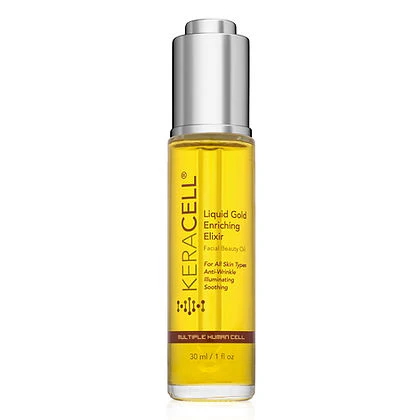
Find it HERE
Neptune in the 6th *Caretaker of the Soul*
Celebrity Doppelgänger: Clio Goldsmith, French Femme Fatale actress of the 80’s
The 6th house is ruled by Mercury, guardian of travelers and souls of the dead, helper of thieves, Messenger of the Gods, inventor of music and writing – also the Lord of borders and connections – a living interface between heaven above and the underworld below. Our 6th house ‘duties’ are not merely worldly tasks, but something sacred and ritualistic, ordering the cosmos and ensuring a sense of cohesion with the totality of existence. 6th house service serving the gods themselves, it is best expressed through tasks that embody divine meaning. And yet, this work of building bridges between heaven and earth is not always fully conscious in an individual. As the deity who seeks incarnation is the oceanic source, Neptune in the house of ‘work’ involves an intrinsic dilemma. Neptune is inclined to suffer the boundaries the 6th house imposes with its sense of order, structure, timeliness and efficiency. Especially compassionate with animals and pets, your imagination and compassion flourish through service; you’re drawn to roles where you can help others, but need to be careful around any sense of inflated ideals. Aiming to serve unconditionally, if you don’t draw some boundaries, you could easily feel taken advantage of. Often at a loss for dealing with practical matters in a straightforward way, deceiver deceiver join hands in the workplace. One might give in to co-workers too easily, or fail to take credit for one’s own hard work. A caretaker of the soul as much as the body, you excel at bringing a touch of the divine into your everyday activities.
Your relationship with your health can be complex and nuanced. Less attractive manifestations of this placement include hypochondria, a fear of the invisible influx of chaos projected onto the body through fantasies of fatal disease. Allergies and skin conditions suggest and inability to keep the outer world out, and a subsequent feeling of helplessness. Is Neptune’s dreamy energy making routine tasks feel burdensome or uninspiring? There’s a risk of developing an unrealistic or impractical approach to life, glossing over the details of managing day-to-day affairs. Avoiding or ignoring essential responsibilities only leads to confusion, chaos and guilt. If one cannot commit to somatic techniques which both purify the body and channel the great sea of energy – yoga, meditation and the somatic arts – the knee-jerk reaction will likely be a total and complete flight from reality.
The healing powers of Neptune in the 6th are palpable, often proving to be a source of great suffering when personal boundaries are not established. The longing to look after others may be linked with one’s own unconscious feelings of helplessness and victimization in the face of a chaotic world. The idea of work as sacred is fundamental to our understanding of the 6th, the ideal of each individual happily contributing one’s skills to the whole reflects Neptune’s utopian vision at work. Cultivate the awareness that tranquilly does not arise from a desire to ‘do good’ but can be glimpsed more easily in the divine order which stands behind even the most mundane facets of everyday experience. While it’s natural to polarize, to attempt to eradicate Neptune’s foreboding threat of chaos, the 6th house keys to mastery are embedded in the sacredness of the here and now. Entrust your vast transpersonal powers into the fabric of ritual – crafts, skills, practices – and you will eventually come to find every aspect of daily life full of exquisite beauty and meaning.
Rx: Elderberry Syrup
In the house of alchemy and holistic health, Neptune’s magnetic healing powers go hand in hand with a near pathological sensitivity, both of which reflect Neptune’s porousness and inclination to fuse with outer objects in the state of participation mystique. In the 6th, everything one has developed in the preceding five houses is given form and anchored in daily life. In the house of health/disease, physical complications expressed here are often an expression of misguided Neptunian longing. In the name of plant-powered, preventative medicine, I give you Heartland Elderberry Syrup. In the name of 6th house purification, this premium Elderberry Syrup is made with just five functional ingredients. With Zero added water, a serving a day delivers full-strength immune support. The potency of undiluted elderberry juice meets raw, unfiltered antioxidant-rich honey, fresh ginger juice to support digestion and circulation, ceylon cinnamon and star anise for its immune-boosting and respiratory benefits. Handcrafted in small batches by a husband and wife team, this glass barrel of whole-body wellness affords easy-to-swallow, year-round support for the whole family. Perfect for any Neptune in the 6th building an intentional, daily routine, the absence of artificial preservatives, corn syrup, gluten and dairy truly make it a juicy spoonful of heaven. Chock-full of antioxidants, flavanoids and vitamins, it’s literally the most delicious of ways to prevent the cell damage caused by free radicals while improving overall heart, brain, digestive and skin health.

Find it HERE
Neptune in the 7th *Savage Lust or Sacred Mirror?*
Celebrity Doppelgänger: Kehlani
Neptune in the House of Marriage suggests transcendent, extraordinary, sacred love. Characterized by a strong desire for soulmate connections, one takes a creative approach to relationship, engaging in many fulfilling artistic/spiritual collaborations. In the 7th, Neptune’s dream of paradise becomes the vision of perfect union – one yearns to be contained, nourished and unconditionally loved forever. And yet, Neptune’s cloudy atmosphere means you tend to idealize partners, perhaps overlooking major issues. Is that a little spice, or a sizzling hot red flag? Neptune’s influence can make it difficult to discern reality from fantasy, potentially leading to deception in love. Are you losing yourself in relationship to avoid personal issues or responsibilities? One may gravitate to partners who are in need of healing support, or who display escapist, unreliable or deceptive behaviors – leading to a pattern of over-giving or being taken advantage of. One could be a gifted counsellor or minister to the needs of others – a more appropriate vehicle for the expression of the mythic redeemer. Learn to differentiate between intuition and wishful thinking. When past life connections or unresolved issues from previous lifetimes surface for healing – it’s an opportunity for profound growth and understanding when approached with awareness and compassion.
If more rational functions dominate, one remains unaware of romantic expectations, perhaps even vehemently disclaiming them. Perhaps the familiar cry is avoidance – fear of being devoured or smothered by a needy and dependent partner. Is an unconscious quest for redemption through and by others leading to paradoxical feelings in love? Perhaps one marries a parental-surrogate, mother-father in one, who, after a time, begins to devour. Maybe you’re the lover, ‘innocently’ breaking up other people’s relationships in the guise of ‘saving’ the partner trapped in an unsatisfying bond, or alternatively, playing the deceived spouse. Neptune in the 7th loves triangles! Behind the noble salvation of other lost souls lies a thirsty child unwilling to face the enormity of its bottomless pit of needs, nor the despair of not having them met. Is playing the ‘strong’ partner to a weak mate a disavowal of personal fragility? While 7th house difficulties begin with projection, once the underlying pattern is owned, the real work begins. Call upon Saturn’s realism to reveal your own hidden agendas – those manipulative ploys which sabotage the development of self-sufficiency necessary to discover Eden within.
One may become addicted to the pursuit of the unattainable, those glamorous, elusive mental phantasms which calculate endless possibilities of salvation in a neurotic, fancy-free. In a flesh-and-blood relationship, Neptune can barely sustain its fantasies, hence the 7th house Neptune’s penchant for locking eyes with a ‘soul mate’ who is already married or sexually disinclined. Maybe you’ve already eschewed all hope of a happy relationship, suffering alone or with an unfit partner. The 7th is also the house of the masses, Neptune here requires other players to unfold its saga, and all of them – devouring oceanic mother, divine redeemer, and suffering victim – are usually projected. If you live to express your Neptunian dreaming primarily in public life, miraculously attuned to the needs and suffering of the collective, be careful not to be so ‘blinded by the light’ you misread your own selfish aspirations to power. In the house of open enemies, Neptunian leadership elides too easily with the Neptunian victim torn apart. Remarkable sensitivity to the pulse of the collective is largely self-generated, arising from a concoction of idealized fantasies, infantile needs and the nature of your life partners. With the glory of theatricality infusing all life, suppressing Neptune’s longing offers no solution, what will eventually slip in through the back, appearing in one’s beloved or in an ungrateful public who have turned against their idol.
Rx: Make Magic Tea (The Howl of Hallelujah)
It is a sufficient understanding of one’s own and others’ limits that determines whether this Neptune creates a life of victimization or one of richly rewarding bonds. With Neptune in the 7th, the highest order is turning disillusionment with others into a karmic portal of self-understanding. Allowing others to be both mythic and human, explore the vast dimensions of sacred union, letting each ‘other’ become the mirror reflecting back facets of your own soul. No better way to stir the magic cauldron of soul connection than with a spot of heart-opening, nervous system stabilizing loose-leaf tea. From the brand concocting medicinally potent remedies which honor the principles of harmony, Make Magic Tea (The Howl of Hallelujah), offers an exquisite blend of rose petals, blue lotus, tulsi, nettle and skullcap.

In collaboration with Rising Appalachia, this spirit-enhancing floral medley calms the nervous system while helping you tap into your intuition and power. Comprised of herbs traditionally used for facilitating access to magic, the tea’s soothing and euphoric properties elevate pituitary and pineal gland function. Devoted to their efforts to bring Central and South American plant-medicine to the consumers, Anima Mundi apothecary is your Brooklyn-based source for the crème de la crème of herbal adaptogens and antimicrobials, which encourage cellular health, relieve anxiety and insomnia, heighten awareness and awaken the third eye. Organic, wildcrafted, and ethically grown, this simply delicious, fragrant tea is nothing less than pristine, undiluted medicine for the mind, body, and soul.

Find it HERE
Neptune in the 8th *Big Cobra Lady*
Celebrity Doppelgänger: Maria Montez, the groundbreaking Dominican actress hailed as the Queen of Technicolor
The 8th house crosses those thresholds where one must bow to what is hidden, rotten and ready to be transmuted. Emerging from the underworld, 8th house planets shatter existing conditions, provoking great anxiety and distress. Sometimes in life, we must, like the serpent, shed and renew ourselves. Natives with heavy Scorpio and 8th house placements often experience several ‘incarnations’ in one, with the course of life punctuated by crisis and regeneration. When tranquil continuity evades, we are invited to become aware of something deeper than the mundane world of cause and effect. Crisis may center around issues of separation, loneliness or helplessness; with responses full of sadness and longing. Physical death is but one possible level upon which the 8th composts and combusts. Whether the death-wish results from confrontation with apparently irreconcilable conflicts, inverted destructive impulses, or an instinctive repudiation of life – the greater amount of courage we bring to our ‘soul sickness,’ the higher we rise from its ashes.
If one were to consciously engage in a bittersweet, cyclical melancholy, this might lawfully be expressed according to one’s capacity and talents. Maybe you’re a tortured artist plumbing inspiration down in the depths of a well of unbearable sadness. If one’s Neptune operates unconsciously, it is more likely to erupt with overwhelming force. Throwing into razor-sharp relief the bleakness of mortal life, 8th house ‘rock bottom’ moments herald the possibility and need for major cleansing, the relinquishing of attitudes or attachments obscuring the heart and soul. A prophetic harbinger of deep and constructive change, feelings of depression and yearning are an inevitable response – provided the ego is strong enough to recognize the value of one’s descent. Perhaps one’s yearning takes the literal form of the courting of oblivion. Janis Joplin, with natal Neptune square Moon on the cusp of her 8th house, died from a heroin overdose. Cult leader Jim Jones, who committed collective suicide with his followers, also had Neptune in the 8th. Gratefully, the redemption need not be deadly.
The 8th being concerned with the loss of the power acquired in the 2nd through individual autonomy and the establishing of personal values, 8th house addictions center around attachment to a loss of self. Called the house of sex, death and taxes – when we are open to another person during the sexual act, we relinquish control. Hence the orgasmic ‘little death,’ and becoming over taken by instinctive forces experienced through intimacy. Perhaps the sex act itself becomes the longed-for redeemer; the moment of oblivion a reunion with the divine. Neptune in the 8th signifying gifts of ecstatic pleasure, some give of themselves sexually as a form of service. Associated equally with sexual inhibition as it is with sexual openness, Neptune in the 8th may compensate for vulnerability with heavy defenses. Perhaps it is one’s partner who is perceived as emotionally/sexually devouring. Has a complicated relationship to shared resources left you feeling bludgeoned? In financial matters, Neptune brings the fog. With losses occurring via partnerships or investments, let potential partners earn your trust, exercising caution when it comes to investing in potentially fruitless endeavors. Not only do dreams and fantasies possess extraordinary meaning and power, an aptitude for psychological or psychic work might just be the medicine pulling you out of the demon’s clutches. Fascination with the mysteries of life helps one unlock profound gifts of emotional healing. On the flip side of Neptune’s signature loneliness of the exile, psychic sensitivity and mediumistic abilities afford the potential for deep, soulful connections and blissful intimacy.
Rx: Black Moon Lilith Cosmic Alchemy Oracle
As merging your aura with others leads to confusion and emotional entanglement, honor your psychic gifts by creating solid boundaries, which in turn fosters more balanced energetic exchanges. If life is chosen over death, and joy over shame, Neptune in the 8th can become a true initiate of the mysteries. And no better dark feminine bedfellow to the 8th house alchemy than Black Moon Lilith, the devouring and disavowed feminine. Brought to you by Astrologer and Author Adama Sesay, your 8th house Neptune Rx is an oracle deck for self-reflection and inner transformation.

A divination tool designed to help folks access intuition via mythological archetypes of the dark feminine goddess Lilith, this 44-card oracle deck combines the esoteric wisdom of astrology and hermetic alchemy to guide and empower your manifestation journey. If you’re ready to reclaim the dark divine feminine’s ancient power, the Black Moon Lilith Cosmic Alchemy deck is for you. A cosmic map for those doing shadow work, working with Black Moon Lilith is about releasing ancestral trauma, subconscious blocks, codependency and all those energetic shadows that keep you playing small. Inspired by her literary works (Black Moon Lilith Rising and the Black Moon Lilith Cosmic Alchemy Oracle) it’s just one tool in Sesay’s comprehensive astrology platform designed to reclaim the most misunderstood of feminine archetypes. We are not talking patriarchal Lilith (an over-sexualized, evil, child-killing demon or a point of undoing). Rather, Lilith, through an intersectional lens, is a cosmic symbol of liberation from subjugation, shadow alchemy through oppression, and an unapologetic rebellion in the face of white male capitalist patriarchy. “Not only is Black Moon Lilith a metaphysical tool for healing—your entire birth chart is,” writes Adama. Astrologer, Tarot Reader, Author, Occultist, Entrepreneur, Marketing Guru and Beauty Industry Expert – Adama’s work blends over a decade of experience in astrology, mysticism, beauty and fashion. Listen to her Black Moon Lilith Rising Podcast. Learn more at lilithastrology.com
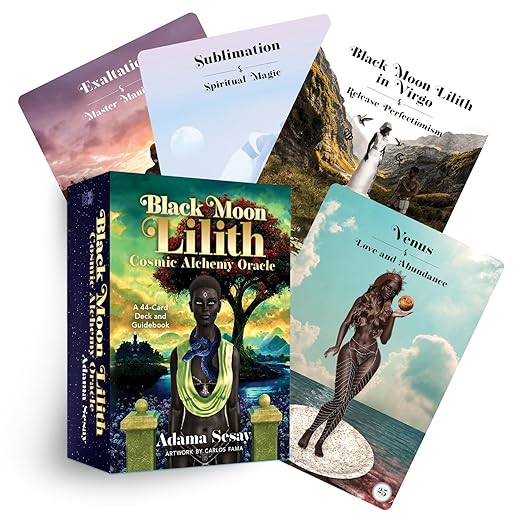
Find it HERE
Neptune in the 9th *Clairvoyant Vagabond*
Celebrity Doppelgänger: Yara Sayeh Shahidi
Neptune’s mysticism comes home to Jupiter’s temple, where the source of life is not pursued through comfortable surrogates, but throned as a deity outright. Perhaps ‘God’ is experienced as an oceanic divine source, in God as Love. Redemption often takes the form of overt religious or spiritual themes; heaven and hell matter to Neptune in the 9th! And yet, Neptune is not simply a deity of endless compassion. As the maternal source, it can also punish, devour and destroy! Is your Neptunian redemption parading as the terror of God, the anticipation of judgment day? Sacrifice and suffering forming a major part of Neptune’s spiritual ethos, notice where this elides with spiritual exclusivity, or a tendency to project spiritual or moral authority on others. Perhaps one’s high and mighty Neptune in the house of mutable fire expects to be excused for all manner of bigotry, violence,and intolerance, simply because one believes. With Neptune in the 9th, ethics may fly out the window, along with courtesy and respect for others’ intelligence, rights and boundaries. Don’t become that self-appointed redeemer who justifies perpetrating atrocities in the name of capital-G ‘God.’ With Neptune’s psychic prescience offering a capacity to enter into the emotional currents of the collective psyche with startling intuitive accuracy, one could easily become a prophet and mouthpiece for the moral and religious dilemmas of the collective. Bob Dylan, the folk voice for an entire generation of Americans, had Neptune in the 9th.
A longing for deep, soulful transformation and a tendency to romanticize sometimes leads to feelings of ominous foreboding, strange dreams, self-deception and a lack of clarity regarding one’s true path. Intentional communities and communes may be especially attractive. Cultivate discernment to avoid blindly following any one belief system or guru. If there is insufficient capacity to sift teachings through one’s own experience and value system, one may display dangerous gullibility. Loving obedience to God may be the appropriate path; the challenge lies in the differentiation between the divine source and the mortal teacher. Often, Neptune’s deep sense of exile means that home can never be found on Earth, one’s true home lies beyond it, putting one perpetually on the road, searching for the perfect place or culture. Collective definitions of God are eternal, neither bound to time and space nor any particular historical period. Make sure to balance Neptune’s vision of a loving source with reflection, objectivity and common sense. Ensure that your wanderlust is driven by a genuine desire for growth and understanding, rather than escapism. If not bound to a Piscean world-view which equates spiritual commitment with obedience to religious authority, one can become a natural visionary articulating universal themes of human suffering and longing. Incorporate spiritual insights into everyday life in meaningful ways. Never forget that a life lived righteously is its own splendid reward.
Rx: Caffeine Energizing Hydrogel Eye Patches
The 9th is that arena of experience where we develop a world-view which allows us to integrate our life with universal patterning. Whether one allows religion, philosophy, travel, or higher education to perform this function, a desire to understand karmic unfolding drives you to gain wisdom along the most mystical of channels. In the house of the pilgrimage, one can be renewed and invigorated by travel in that it affords a broadened perspective of human nature, removed from the stain of the local and personal, heightening one’s sense of life as a meaningful whole. On that note, when you feel the need for speed and the urge to roam, hydropower the lift off with caffeine-infused eye masks designed to brighten, hydrate and reduce puffiness. Dance, pray or proselytize the night away while retaining that bright, wide-awake look in a matter of minutes, no eight hours of shut-eye needed! Brought to you by Good Molecules, Caffeine Energizing Hydrogel Eye Patches are the perfect pick-me-up for puffy, tired-looking eyes. Not only are the eye patches affordable and safe for the planet, much like the optimism of the Jupiter-ruled 9th house, they feel almost too good to be true.
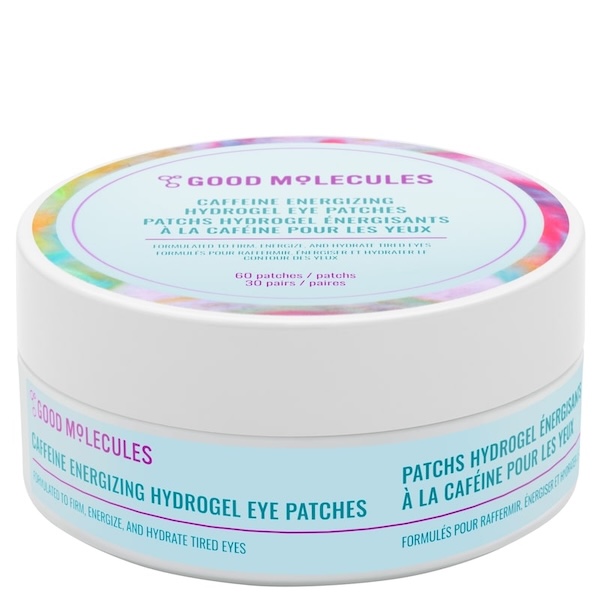
Find it HERE
Neptune in the 10th *Mystic Mayhem, Fluid Fame*
Celebrity Doppelgänger: Diana Ross
Cohabiting with the ‘Midheaven’ or point of Career Destiny, the 10th house is not merely a point of public recognition. Equated equally with the Mother/Caretaker and Maternal Archetype, the 10th house Saturnian Mother as form-giver and physicality means the material world ‘matter’ and ‘Mater’ (Mother) are one and the same. As mother’s physical reality forms the parameters of the infant’s universe, whatever is embodied by the mother of origin affords a unique personal inheritance. It is an essential pattern we experience first in the maternal relationship, and later in our efforts to establish ourselves as independent adults in the world of limits and laws. Issues reflected by 10th house planets shape our assumptions about our place in society and the contributions we can make. Neptune in the 10th often signifying a type of creative or mystical ‘fame,’ one could easily gain notoriety in any field requiring imagination, artistry or idealism. Pledging faith in something greater than oneself, professional life is imbued with an ineffable touch of mysticism and spirituality. Bringing an element of glitter and glamour to one’s public persona, nebulous Neptune’s influence on your reputation tends to be as fluid and elusive as you are!
Neptune in the 10th often looks like espousing as deeply an ambivalent relationship with the collective as it does with one’s blood mother. Drawing nourishment from all the applause, Neptune in the 10th may recreate primal fusion between performer and audience. Not to mention, generate deep feelings of loss, anxiety and despair should the audience throw rotten tomatoes at the act! The collective here embodies the source, life-giving in its love and approval, life-threatening in its wrath. Neptune secures the illusion of unconditional love by becoming what everyone else wants. And yet, the redeemer put on a pedestal and worshipped is also the redeemer torn apart. Like a small child lost at sea, one is eager to please, content to fulfill the mother’s ambitions and expectations. The problem is the absence of an internal impetus for independent choice.
Have you chosen your vocation out of unconscious compulsions which – infantile, spiritual or both – will tolerate no other option? Others may prefer to identify as one of life’s ‘losers’ – preferring martyrdom to defined identity. One may consciously feel victimized by oppressive social forces (conservatives, government, patriarchy, capitalism, or other marvelous hooks for Saturnian projections) and wait for the end of days when the meek shall inherit the Earth. Perhaps one perceives the world as a prison camp for those who need redeeming, first of which is the mother herself, whose suffering demands devotion. Boundaries become blurred. 10th house Neptune might view the world as full of misery, gravitating toward the healing professions. One might excel at spiritual counseling, healing practices, or work in rehabilitation centers. It’s vital to establish strong, energetic boundaries and develop self-care routines that cleanse and rejuvenate. Never let disillusionment extinguish your inner flame. If one comes to identify with the victim-redeemer as outlaw, one may justify deceit. Whether architecting the means of your own downfall or feeling ‘above’ the laws of society, there is usually an element of drama married to one’s social role. Due to a magical quality of mirroring which attracts calumny and idolization in equal measure, Neptune in the 10th is enormously attractive. For a relatively conscious individual, this power may be put in the service of the greater good, or at the very least, exorcized through creative talents. If your professional life were to fall to pieces, an honest confrontation regarding one’s mother relationship or mother-wound is the remedy. Without it, Neptune becomes a victim of forces beyond one’s control.
Rx: Regenerative Body Cream with Copper Peptides
Notice where you have vowed to not only play the redeemer, but also fish-food, to be born nurtured and swallowed up. With 10th house Neptune’s material goals linked to early experiences of maternal limits and boundaries, one may feel as if one’s progress is not within one’s own hands. Retreat from the world whenever possible, seeking the solitude and inner clarity found in seclusion. At the intersection of 10th house fame and Neptunian sanctuary, a little regenerative care goes a long way. With the latest Regenerative Body Cream by Vitali, self-care has never felt so chic. Crafted to support your skin’s natural renewal processes, Regenerative Body Cream with Copper Peptides is lightweight yet luxuriously hydrating, leaving you with velvety soft skin all day long. Lather away this wrinkle-diminishing organic body cream, it’s living proof that nature and science can work in harmony! Enriched with skin-loving ingredients, Copper Peptides actively promote collagen production for firmer, more youthful-looking skin. Not only have studies shown how Copper Peptides combat free radical damage, they prevent the formation of senescent cells that accelerate aging. Hyaluronic Acid provides intense and long-lasting moisture, while botanical extracts nourish and soothe. Rosemary oil polishes away cellulite. Powerful antioxidants help to protect your skin from environmental stressors and premature aging. Not only are all Vitali products hypoallergenic, free from harsh chemicals and artificial additives, sensitive skin-friendly and cruelty-free, the brand donates 5% of profits to Alzheimer’s research exploring the benefits of Copper Peptides in treating dementia.
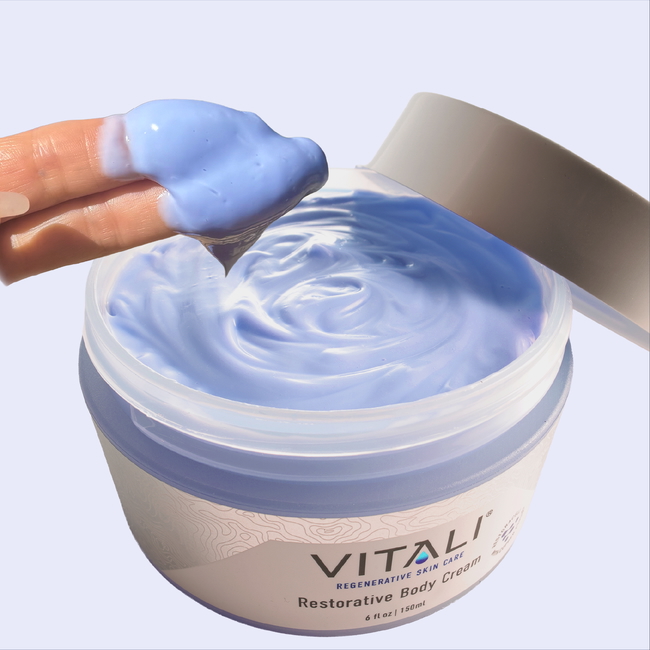
Find it HERE
Neptune in the 11th *Lucid Dream Team*
Celebrity Doppelgänger: Jessica & Lisa of the electro-pop duo The Veronicas
Called the house of hopes and wishes, networks and groups, friends with benefits, mob mentality, the elite and technology… the 11th house corresponds to the 3rd eye, representing our very human attempt to go beyond ego-identity and merge with something greater than one’s self. With a direct line to the collective consciousness and a desire to create a better world, idealism couldn’t be higher. Balance such an exalted vision with sufficient realism, so that the dreams can be given form as valuable contributions. One longs to be connected to a diverse array of individuals who share a common vision for a more compassionate and inclusive world. While esoteric or spiritual communities are alluring, the reality of group dynamics often doesn’t meet expectations. Reflect on which social milieus genuinely uplift and inspire you, and which distort and distract. One may be attracted to those who are struggling with addiction or instability, or become enmeshed with enigmatic, seductive, or erratic personalities that challenge your boundaries and equilibrium. One may have a powerful attraction to ‘strays’ whom everyone else gave up on, or toward the ill or those enduring the most tragic of circumstances. Practice discernment; others may not be what they seem. Drawn most to those who embody creative, mystical, or unconventional qualities, one forms dreamy, empathetic bonds.
Perhaps you feel saved through the act of saving others. Neptune’s altruism contains within it both infantile needs and genuine responsiveness to the interconnectedness of all beings. Unless one is able to cope with loneliness, idealization of the group may submerge the individual in a collective that erodes personal values and integrity. Has your utopian community become a devouring monster, demanding absolute obedience amongst its ranks? Don’t let over-identification with a redeemer role lead you to overlook other equally important needs. ‘Soul unions’ of the 11th being neither emotional nor sexual, but rather the meeting of minds and spirits, they provide 11th house Neptune its antidote to the loneliness of incarnation. One may attempt to establish a surrogate mother-child relationship within a group to which one becomes attached. As for who plays the mother and who the child, one may be either, or secretly both. Once again entering Neptune’s hall of mirrors, friendships tend to involve intense emotional undercurrents and symbiosis. BFFs may take on mythic proportions, without whom one feels bereft and outcast. This can contribute to deep and enduring bonds, or alternatively, waves of pain and disillusionment. When characterized by a genuine willingness to make any sacrifice, Neptunian friendships take us as close to the gates of Eden as possible.
Rx: Jelly Lunar Flat Lay Makeup Pouch – Espresso
The 10th house is concerned with the masses and the collective in an ‘I-thou’ dynamic reflective of one’s personal skills and authority. In the 11th, one is tasked with giving away freely as a gift what one has mastered or built in the 10th. Individual achievements mean little without this larger context. As we enter the 11th house, we come to belong to a larger, comprehensive whole. As seen in Cosmopolitan and VOGUE, check out this maverick makeup pouch built for life on the go! Bringing serenity back to your daily routine, it’s designed to help you say goodbye to stressful mornings and hello to enlightened presence. If you’ve read this far, you’re probably some sort of paradigm shifter, a future-forward thinker on the brink of the next genius discovery, which doesn’t leave much time for primping at home! Whether you’re doing your makeup in the ladies’ room or on the train, the lunar shape folds out completely flat into a mat, giving you and the girlies easy access to all your essentials in seconds. Brought to you by The Flat Lay Co., the Jelly Lunar Flat Lay Makeup Pouch is made from durable, wipe-clean jelly material and finished with a convenient grab handle. Inspired by mornings, built for beauty goes the tagline for this UK-based wonder brand and its trending espresso brown accessories.

Find it HERE
Neptune in the 12th *Unveiling the Depths*
Celebrity Doppelgänger: Chaka Khan
Neptune in the 12th secures a deep, unspoken connection to the vast realms of the subconscious and ethereal. One’s journey towards self-understanding feels shrouded in mystery, necessitating quiet introspection and a willingness to plunge naked into the unknown. Drawn to embodied explorations of the occult, there’s a persistent pull towards spiritual wisdom that can only be accessed through solitary practice. In the final house of the zodiac, we explore Neptune’s primal longings unadulterated. Traditionally known as the house of imprisonment, confinement and self-undoing (not to mention death, insanity, ancestors and secret enemies), Neptune is nonetheless strongest in its own house! The challenge becomes working with this strength in ways that promote rather than erode life. Also concerned with our ‘inheritance’ from the realm of ancestors, in the 12th we discover a living archive of images, myths, traditions, feelings and dreams. In the 12th, ghosts of our past come back to haunt us, the family ‘skeletons’ in the closet rear their gnarly heads. Artistic vehicles need to be found for fantasies that are older and larger than us. More likely than any other Neptune placement, this native recognizes the essential divinity in the whole of life and is left wide open to external influences as a result. Receptivity to powerful forces being the realm par excellence of the artist, one may become addicted to the creative powers of the psyche. One may struggle with confusion, escapism, or difficulty distinguishing reality from fantasy. If Art does not provide a means of redemption, one likely shoulders the burdens of family secrets, sins or unhappiness. Cultivate a community network of support to feel understood in your metaphysical quest. Anchor yourself with meditation and time spent in nature.
One may walk the precarious line between Neptune as visionary, artist and healer; and Neptune as addict, invalid or psychotic. The mystical or oceanic ‘peak’ experience may easily be achieved, and it can be redemptive and life-enhancing. Alternatively, one could easily become the scapegoat or vessel for family conflicts tracing back many generations. Solid individuality is your only defense against inherited familial misery, which often materializes later as mental or physical disintegration. Perhaps one is heroically forced to confront the completely limited and sometimes downright racist and sexist definitions of sanity and normality espoused by one’s culture of origin. Neptune’s eternal enemy is also Neptune’s eternal friend, and a little Saturnian realism goes a long way in assisting any 12th house planet floundering in the deep. Mercury, mythic guide of souls and natural polarity to Neptune/12th house energies, provides another equally important intellectual scaffolding or ark. Even where a breakdown occurs, one’s capacity to use the experience constructively depends in part on comprehending what happened in clear terms – naming and claiming demystifies. A craving for drugs, or a transcendental journey? Don’t let intangible anxieties become secret sorrows. A natural inclination to help those in need draws you to healing fields and alternative medicine.
Rx: Sea Salt Hair Texturizing Spray
In the 12th house Neptune comes home, or is rather dragged home, in spite of itself. Called the house of pre-birth, the 12th describes our mother’s pregnancy, when we are contained within the waters of the womb. In the 12th house, anything goes! Like its ruler Pisces, it embodies the wisdom of the entire zodiac. Ultimately representing the urge for dissolution, in the 12th house we must reconcile once and for all this yearning to return to the undifferentiated waters of the womb, the original state of unity. In the name of oceanic grace, make sure to try out this hydrating hair and scalp spray infused with sea kelp extract. Whether you’re looking for effortless beachy waves or courting the whispy romance of touchably soft curls, look no further than Sea Salt Hair Texturizing Spray by Uplift Provisions.

Achieve that relaxed, lived-in look while nourishing, strengthening and protecting your hair. Miracle ingredient sea kelp extract promotes hair growth, strengthens hair follicles and hydrates the scalp. Jaborandi extract strengthens weak or thinning hair, reducing hair loss or breakage. Chamomile extract calms scalp irritation, adding natural highlights and shine. Adding visibly sexy texture and volume, sea salt absorbs excess oil. The cooling sensation of peppermint oil stimulates hair follicles and promotes growth while soothing dry scalp. Meanwhile, the significant antibacterial and antifungal properties of lime oil cleanse, balance oil production and add shine. For the 12th house Neptune with stressed-out locks, UPLIFT’s Sea Salt Hair Texturizing Spray is like soul food.
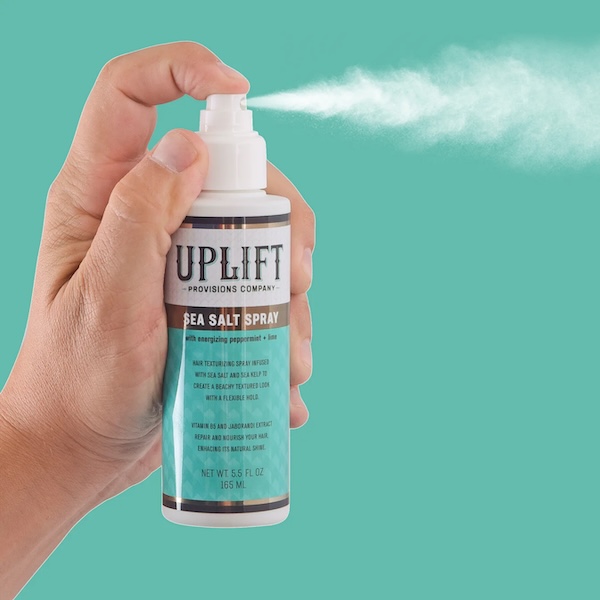
Find it HERE
To learn more about your natal chart & cosmic potentials *written in the stars* book a reading with Midheaven Or Nah HERE. Follow her celebrity Astro-oracle on Instagram @midheavenornah
Bibliography
The Astrological Neptune and the Quest for Redemption by Liz Greene, York Beach: Maine, Samuel Weiser, Inc. (1996)
SYMBOLS FOR WOMEN: A Matrilineal Zodiac by Sheila Farrant, London: PANDORA Press (1989)
Chiron and the Healing Journey by Melanie Reinhart London: Starwalker Press (2009)
Chiron: Rainbow Bridge Between the Outer and Inner Planets by Barbara Hand Clow, St. Paul: LLEWELLYN PUBLICATIONS (1988)
ASTROLOGY: The Library of Esoterica by Andrea Richards, foreword by Susan Miller, Hohenzollernring: TASHCEN (2021)
“The Mind-and-Skin Connection” Psychology Today, by Deana Shevit Goldin, Ph.D., DNP, APRN, published online June 23, 2021′

